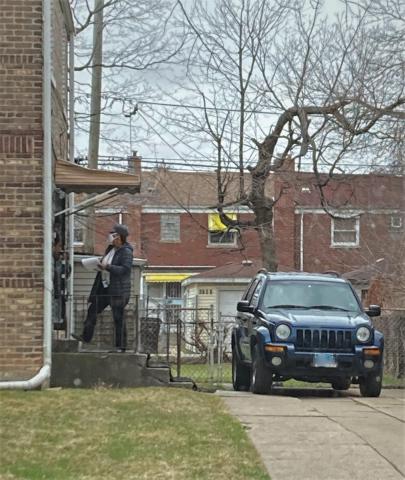A typical day for Alicia Stewart, an investigator with the Public Defender’s office for 21 years, involves six hours on the road, driving from Wilmette to Calumet, knocking on doors to talk to witnesses who can help build a defense case. She even travels out of state, flying as far as Arizona to interview witnesses and make arrangements for people to come testify in Cook County.
Many not guilty verdicts and other favorable outcomes for public defender clients come about thanks to the work of more than 50 investigators like Alicia who work closely with attorneys to build cases. Investigators track down witnesses who can help the defense, interview them and deliver subpoenas for them to appear. They take measurements at crime scenes, photograph injuries and testify at trials if needed.
Persistence and personality
Investigator work takes persistence. Alicia remembers a public defender who told investigators to “find the person or give me a death certificate.” And that’s what she tries to do.
Currently assigned to work with seven assistant public defenders, Alicia juggles multiple cases, helping to track down witnesses who might corroborate an alibi, impeach a prosecution witness or provide an alternate perspective on an incident.
She uses multiple databases, court records and prison records to find an address for a witness. She often visits multiple times at different times of the day trying to find the person at home. “There is always a nosy neighbor willing to help,” she says.
Investigators for the public defender’s office generally come from criminal justice and law enforcement backgrounds.
Before joining the public defender’s office Alicia worked in a number of roles at the Chicago Housing Authority Police Department, and as a police officer in Posen, Illinois. Now, as an investigator, she often has to explain to people who have already been interviewed by law enforcement and by prosecutors that she is not a police detective.
“You have to like people, have patience and compassion because everyone deserves great representation and this office delivers that,” she said. “You are often the face of the office, and you develop a rapport with people.”
“The more they see us, the more they understand that someone sees their side and they won’t be thrown to the wolves,” she said.
Chief of Investigations Stephen Ramsey says the work of investigators is crucial to the office’s mission to provide the finest legal representation for all clients.
“We strive for the best possible outcome for everyone we represent, and investigators are key to building a strong defense case. I am in absolute awe of the work done by the investigative team. They are the public face of our office in communities every day, helping people understand our role protecting their rights in the justice system,” Stephen said.
Show your work
Interviewing witnesses is just part of an investigator’s job. Back at her desk at the Cook County Courthouse in the afternoon, Alicia writes up reports. On video calls with witnesses, she makes sure to ask them to hold up their identification document. She calibrates measuring devices before taking measurements at a crime scene.
“A big part of investigating is showing your work, writing up the reports, showing that your measuring device is calibrated correctly,” Alicia said. Evidence has to stand up in court.
“We just didn’t give up”
Alicia looks back on many memorable cases and favorable outcomes for public defender clients.
One case that stands out is the post-conviction investigation of Xavier Walker, who served 22 years in prison for murder before being granted a retrial and having all charges dropped. Alicia and the attorneys on the case visited penitentiaries to talk to alibi witnesses who had not been called in the trial, going to Memphis and beyond to follow up tips.
“We just didn’t give up,” she says.

Safety first
The Cook County Public Defender’s Office puts safety first for all of its staff. Investigators receive safety equipment and training.
Alicia says she is cautious and aware at all times and avoids confrontations.
Just one of Alicia’s safety tips: After she knocks at a door she blocks it with her foot in case a dog lunges out when it is opened.
If someone is escalating a conversation with me, “I talk softer,” she said. “I’m out here to get the answer, even if they are spewing bad things at me.”
“I’m blessed”
With more than two decades as an investigator, Alicia has seen some aspects of the work evolve. Data bases have become more sophisticated; she can Face Time with witnesses; and “you wouldn’t believe the information I find on people’s social media,” she says.
But people skills are still core to every investigation. “I’m blessed. I love my job. I love people,” she said.
